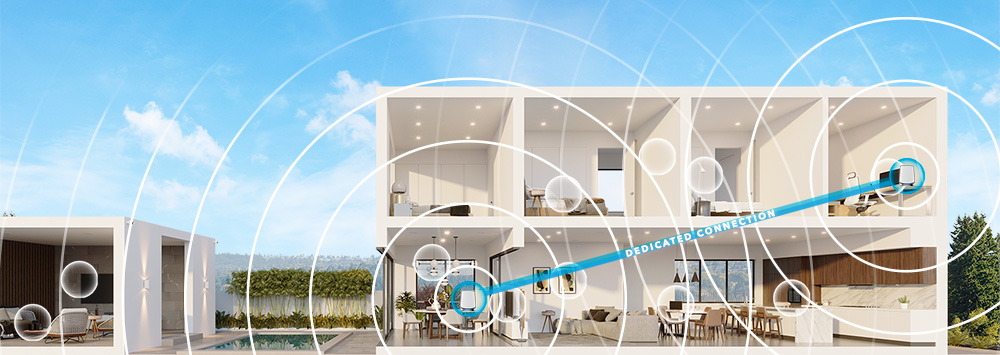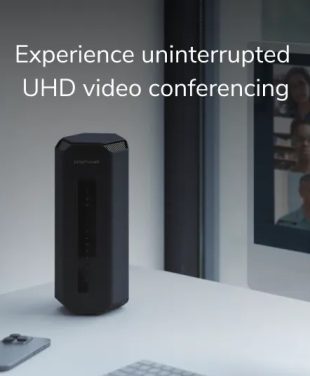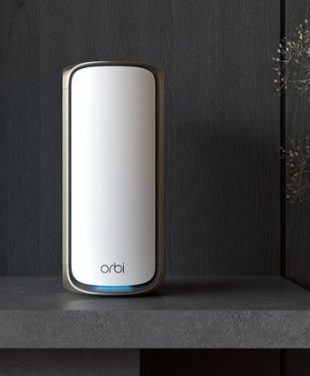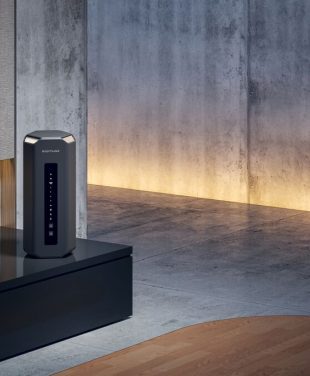IN THIS ARTICLE
- Understanding WiFi Technologies
- Introduction to Router Technology
- Introduction to Mesh Technology
- Mesh WiFi vs Router Performance
- Use Cases for Routers and Mesh Systems
- NETGEAR Orbi Whole-Home Mesh System Performance
- Routers and Mesh System Summary
- Practical Advice for Choosing Between Router and Mesh
- Explore More NETGEAR Routers and Mesh Systems
Understanding WiFi Technologies
A single router manages the Internet connection provided by your internet service provider (ISP). Mesh routers came on the scene around 2015 and have progressively evolved as a setup that includes a main router and satellites. Usually, at least two satellites (nodes) are placed around your house, with the possible option to add more satellites for extended WiFi coverage. WiFi mesh systems work like WiFi extenders, without compromising WiFi speeds as you move further away from the router.
Introduction to Router Technology
A traditional router is a singular device. Although a single router can deliver a reliable WiFi signal, there are limitations to the distance the signal can reach before it gets weaker. A WiFi router signal is prone to dead zones caused by its position and other interferences such as a home layout, construction materials or electrical devices that cause interference. A traditional WiFi router can be a good solution for small homes and apartments with only a few WiFi-connected devices.
For more on Mesh vs Extenders visit this comparison article.
Introduction to Mesh Technology

Mesh systems are built to support seamless roaming and robust signal strength. With mesh satellites throughout the home, mesh network wireless connections aren’t prone to dead spots like a traditional WiFi router. This seamless roaming with the same SSID (unlike WiFi extenders) all connected devices automatically connect to the strongest satellite signal as you move around your home. If you are looking for future-proofed internet and want to scale up, the best WiFi solution could be a mesh system.
For a detailed overview of “How Mesh WiFi Works?” visit our companion article.
Mesh WiFi vs Router Performance
If you live in a small space, a traditional router can give you the WiFi coverage you need. If you live in a large home, a traditional router will struggle to provide the WiFi signal required. If your home (including outside) is more than 3,000 square feet, consider mesh WiFi with satellites so you can roam freely throughout your home and connect to the Internet without latency or WiFi dropout issues. Even if your home is less than 3,000 square feet a Mesh system is often a good choice as it can cover all rooms with a more reliable high-quality WiFi as construction materials, thicker walls, room layout and electronic equipment can all negatively impact WiFi performance.
- NETGEAR Nighthawk RS700S WiFi Router – 19Gbps and up to 3,000 sq. ft. coverage.
- NETGEAR Orbi 970 Whole-Home WiFi 7 Mesh – 27Gbps and up to 8,200 sq. ft. coverage for a 3-pack (1 router and 2 satellites) Expandable to even more WiFi coverage with Orbi add-on satellites.

Use Cases for Routers and Mesh Systems
Knowing how to choose between router and mesh is important. It’s worth asking yourself a few questions before investing in a new WiFi router or mesh system.
- How many people live in your home?
- Is everyone connecting to the internet at the same time?
- Do you enjoy high-definition gaming and other data-intensive activities such as 4k streaming and working from home?
- Do you have many iOT devices such as smart speakers, locks, security cameras, gaming consoles and more?
While you can get a solid and stable performance from a traditional router, there are higher risks of slow WiFi leading to dropped connections or lag depending on the layout and construction of your home. In addition, older standard WiFi 5 and WiFi 6 routers are not always equipped to handle the simultaneous heavy demands and multiple devices that need multiple WiFi networks.
NETGEAR Nighthawk Router Performance
As a WiFi technology world leader, NETGEAR Nighthawk routers and Orbi mesh systems are designed for every scenario. The NETGEAR Nighthawk RS700S router is considered by many to be the best WiFi router for gamers and streamers. This ‘traditional’ router delivers 2.4x faster speeds than WiFi 6 and includes a 10 Gig internet port plus 1x 10Gig and 4x 1Gig LAN ports for ultra-fast wired connections.
For a value-packed alternative, the NETGEAR Nighthawk RS300 Router offers speeds of 9.3Gbps and up to 2,000 Sq. ft. of solid WiFi connectivity. The RS300 includes a 2.5 Gig internet port plus two 2.5 Gig and two 1 Gig LAN ports for fast wired connections.
NETGEAR Orbi Whole-Home Mesh System Performance
Mesh WiFi is designed to eliminate dead zones and congestion issues. Orbi whole-home mesh WiFi systems offer unparalleled performance and coverage for your home WiFi setup, from the front door to the back garden and the basement to the loft. This is generally the best WiFi system for large homes. Mesh WiFi system performance aims to make the online experience seamless for streaming, gaming, browsing, video calls, and virtual reality simultaneously.
Quad-band NETGEAR Orbi 970 Mesh Systems are among the best mesh WiFi products on the planet for larger homes. They offer 360° mesh WiFi network coverage for up to 200 devices in concurrent use, with blazing-fast speeds of up to 27Gbps. The main router includes a 10 Gig internet port, a 10 Gig Ethernet cable port, and four 2.5 Gig Ethernet ports. The router satellites include a 10 Gig Ethernet port and two 2.5 Gig Ethernet ports. Learn more about Orbi 970’s Enhanced Dedicated Backhaul.
Routers and Mesh System Summary
Pros and Cons of Routers
WiFi routers are less expensive, easy to set up, and deliver great performance for internet access in most homes. With a stand-alone router, there is only one device to configure for your home internet. However, you may have little control over where you place your router, potentially leading to dead spots in your home where the wireless signal won’t reach. WiFi extenders remedy individual router range issues but usually sacrifice total WiFi speed in exchange for extended range.
Pros and Cons of Mesh WiFi
There are lots of benefits of mesh WiFi for large areas. You get one or more satellites that you can place strategically around your space. The satellites connect with each other and the router wirelessly to boost the WiFi signal to every corner of your home. You can also connect via Ethernet wired connections for priority devices. A mesh system will give you greater internet coverage without any dead spots. However, if you live in a small home, a WiFi mesh system might not be a cost-effective solution.
Practical Advice for Choosing Between Router and Mesh
Factors to Consider
Start by determining where you need maximum throughput speeds. Important considerations include:
- WiFi coverage area required
- Your ISP Provisioning speed (1+ Gig plans should definitely consider pairing with a fast, modern Router or Mesh)
- Your existing router capability
- The number of devices in your wireless network
- The type of devices, including smart home devices, you want to connect
- Preferred internet speed
- Future-proofing for your expanding WiFi network
- Budget

Explore More NETGEAR Routers and Mesh Systems
NETGEAR Orbi and Nighthawk systems work with any internet service provider. Setting up a home WiFi network is a breeze using the handy Orbi or Nighthawk mobile app. The latest WiFi 7 systems give you the ability to download games, movies, and other large files almost instantly at multi-gigabit speeds. You will appreciate stronger WiFi connections and superior network reliability for a better user experience.
NETGEAR has been a wireless router technology leader for decades and we continue to push the limits of WiFi performance that can’t be matched. Explore our unbeatable range of routers and mesh systems to suit your needs for an unparalleled online experience. The future is now with NETGEAR.




